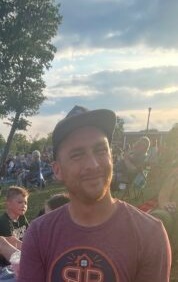 Nicholas Padilla received the FLAS Fellowship award in the summer of 2010 to study Quichua at the Andes and Amazon Field School. Read about his experience below.
Nicholas Padilla received the FLAS Fellowship award in the summer of 2010 to study Quichua at the Andes and Amazon Field School. Read about his experience below.
Why did you apply for the FLAS Fellowship?
I applied for the FLAS Fellowship in 2010 so I could learn Quichua and develop language skills to enable me to carry out my dissertation research with indigenous peoples in Colombia. I hoped to gain a greater sense of the place-based connections between language and local environments, build cultural competence to better engage with indigenous peoples in the region, and challenge myself to learn a new language. I chose the Andes and Amazon Field School because it offered a two-month residential program that integrated language instruction into art, culture, and environmental coursework that reflects indigenous thinking.
What did you do for the FLAS Fellowship?
I enrolled in the intensive Quichua language program at the Andes and Amazon Field School in the Napo Province of Ecuador and spent two months in the Ecuadorian Amazon during the summer of 2010. The field school is a community-based field school that employs local Quichua to work with undergraduate and graduate students. The field school’s intensive language instruction involved nearly eight hours of language instruction every day, and these lessons frequently involved a hike through the Amazon Forest with indigenous teachers who would explain their connections to the plants and animals all around. They would sing us songs about bird calls, explain origin stories of the animals we encountered, and share medicinal properties of the plants we found while walking. We were also fortunate to work with Quichua ceramic experts who shared with us how Quichua art intentionally mimics the natural environment. Collectively, these experiences provided language preparation that centered the rich culture of its speakers.
What are you doing now?
I am an assistant professor in the School of Environment, Geography, and Sustainability at Western Michigan University. I teach a collection of undergraduate and graduate courses that focus on human geography as well as the geography of Latin America. I have continued to work in and around Latin America since leaving UWM. I currently serve as the Vice Chair of the Latin America Special Group of the American Association of Geographers, and I serve on the Board of Directors of the Conference of Latin American Geographers. I fill my time by continuing research with indigenous peoples about their struggles for land and autonomy in Colombia, developing a project in Rupununi, Guyana with colleagues to link qualitative environmental research with remotely sensed imagery and drones, and building research that examines the worldmaking efforts of farmers and gardeners in Michigan. I am also a tired father of two incredible young people, amateur native plant gardener, and plodding runner.
What have you learned from the experience? How have your language skills and FLAS helped or prepared you?
Learning runa shimi (Quichua) has challenged me to think about my research and my role as a scientist differently. The discrete boundaries that exist across university studies do not always translate neatly into indigenous worlds and ways of thinking. For example, generalized concepts of plant and animal species were often too abstract to be reflected in the Quichua language, and Quichua speakers would use Spanish names to refer scientific categories and taxonomies. For example, they would use the Spanish word ‘plants’ (plantas) to refer to all plant life in abstract because there was no Quichua word to describe all plant life. There were words for each individual plant species in their local environments, but it was a reflection of a life deeply embedded withing a particular environment. Learning in this setting offered me an opportunity to reconceptualize how I think about my research, and it forced me to focus explicitly on the specifics of indigenous lives in particular places.
Any other relevant details you’d like to share?
I am deeply grateful for the support the Center for Latin American and Caribbean Studies offered me throughout my time at UW-Milwaukee. Director, Natasha Sugiyama, and Associate Director, Julie Kline, were always incredibly generous with their time and intellectual energy.